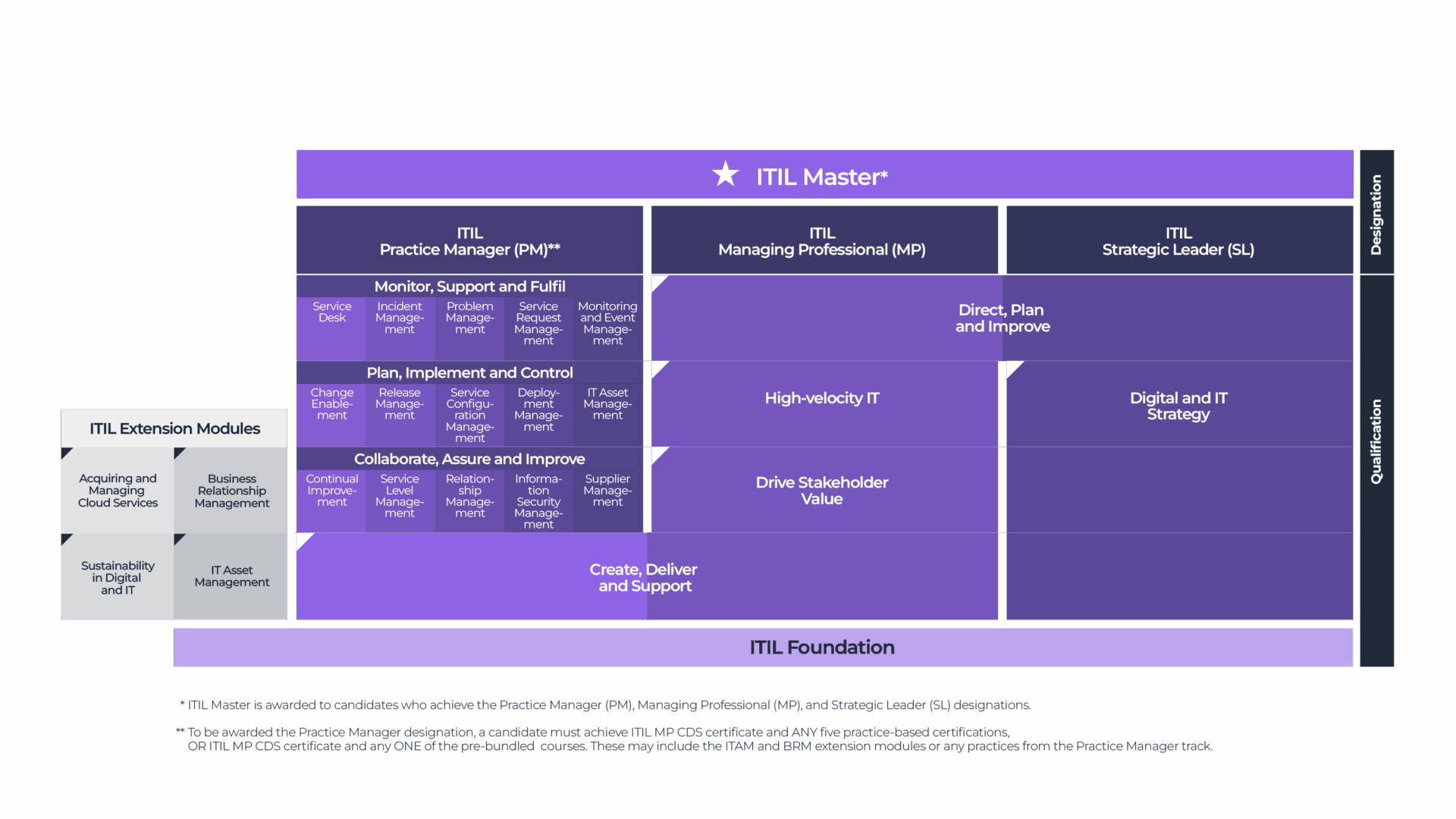Introduce yourself to ITIL 4 with this Awareness course from Good e-Learning!
ITIL 4 is one of the biggest names in the world of IT. The framework is used by businesses of all sizes and is often applied across teams and departments. This ITIL 4 Awareness course will introduce you to the key elements, terminology, and structure of ITIL 4, as well as the benefits of the framework. You will also learn about the certification path and how you can become an ITIL 4 practitioner.
This module introduces the course, including its structure and what kind of resources will be present throughout. It also outlines what students can find in the resources area, including a diagram pack, glossary, and course guide.
This module offers an introduction to ITIL 4, including what it is and how it enables and benefits ITSM. The module also looks at how ITIL has evolved over the years and how this led to the current structure of ITIL 4. Finally, the module takes students through the ITIL certification path and how they can achieve different levels of certification.
This module looks at the terminology and key concepts of ITIL 4, including terms that are essential for understanding ITIL in general. The module then examines value creation and co-creation, both of which are central concepts for the framework. Next, the module addresses the concept of ‘organization’ and how it can take on different roles before moving on to different service offering categories. The module ends by examining the definition of ‘service management’.
This module starts by looking at the Four Dimensions Model and the Service Value System (SVS), two key elements of ITIL 4. The module then looks at two components of the SVS, the Service Value Chain (SVC) and the ITIL Guiding Principles.
This module addresses another element of the ITIL SVS, the ITIL Practices. Specifically, it covers the purpose of and relationship between the seven key practices in the Service Value Chain.
This module features a memory game to review the key terms that have been covered in the course so far.
This final module brings the course to a close by revisiting the elements that have been covered throughout. Together, these pieces add up to the holistic ITSM approach that is ITIL 4.
Students are advised to download course materials to create toolkits for later reference.
ITSM stands for ‘IT Service Management’. It involves using policies, procedures, and best practices to optimize IT services for clients and employees.
ITIL 4 is the latest iteration of ITIL, the world’s leading framework for ITSM. It offers a series of best practices to help IT-powered organizations design, develop, and continually improve their IT services.
Previously, ITIL stood for the ‘Information Technology Infrastructure Library’. The framework has evolved to the point where it is updated so often that it cannot be considered a static ‘library’. Because of this, the name no longer stands for anything.
Students must initially pass ‘ITIL Foundation’. Once a student has obtained ‘ITIL Foundation,’ they can go on to pass the ‘Practice Manager,’ ‘Managing Professional’ or ‘Strategic Leader’ streams. Obtaining all of the Practice Manager,’ ‘Managing Professional’ and ‘Strategic Leader’ certifications allows students to become an ‘ITIL Master.’
Students interested in a specific area of ITSM can take one of the four ITIL extension modules. These do not contribute to the ITIL Pathway.

According to Payscale, certified ITIL practitioners can earn between $51,000 and over $259,000 (or £39,000 and over £200000), depending on their experience, role, and certification level. Even sitting a Foundation course can have significant benefits for ITSM professionals.
ITIL provides users with a set of best practices for creating optimized IT services. It establishes cultures of continuous improvement, ensuring that users can enjoy long-term benefits with IT services continually aligned with business goals and strategies. It also offers proven practices for resource optimization and continuous improvement.
ITIL 4 is a modern framework that fully equips users to optimize their IT practices. It creates cultures of continuous improvement, enabling organizations to deliver top-quality IT products and services whilst also continually reviewing their own processes.
The framework is also highly adaptable and can work alongside other popular approaches, such as DevOps. Finally, the framework is set to continue evolving to accommodate developments in technology and best practices. This makes ITIL future-proof for practitioner organizations.
PeopleCert is the owner of and accrediting body for a number of best practice frameworks, including PRINCE2, PRINCE2 Agile, MSP, ITIL 4, and AgileSHIFT.
AXELOS is a trademark of PeopleCert, the organization behind a variety of highly popular best practice frameworks, including ITIL 4, PRINCE2, MSP, and AgileSHIFT.
ITIL 4 can be integrated with several other frameworks, including Agile, DevOps, and Lean. Some practitioners even use it alongside PRINCE2.
Introduce yourself to ITIL 4 with this Awareness course from Good e-Learning!
ITIL 4 is one of the biggest names in the world of IT. The framework is used by businesses of all sizes and is often applied across teams and departments. This ITIL 4 Awareness course will introduce you to the key elements, terminology, and structure of ITIL 4, as well as the benefits of the framework. You will also learn about the certification path and how you can become an ITIL 4 practitioner.
This module introduces the course, including its structure and what kind of resources will be present throughout. It also outlines what students can find in the resources area, including a diagram pack, glossary, and course guide.
This module offers an introduction to ITIL 4, including what it is and how it enables and benefits ITSM. The module also looks at how ITIL has evolved over the years and how this led to the current structure of ITIL 4. Finally, the module takes students through the ITIL certification path and how they can achieve different levels of certification.
This module looks at the terminology and key concepts of ITIL 4, including terms that are essential for understanding ITIL in general. The module then examines value creation and co-creation, both of which are central concepts for the framework. Next, the module addresses the concept of ‘organization’ and how it can take on different roles before moving on to different service offering categories. The module ends by examining the definition of ‘service management’.
This module starts by looking at the Four Dimensions Model and the Service Value System (SVS), two key elements of ITIL 4. The module then looks at two components of the SVS, the Service Value Chain (SVC) and the ITIL Guiding Principles.
This module addresses another element of the ITIL SVS, the ITIL Practices. Specifically, it covers the purpose of and relationship between the seven key practices in the Service Value Chain.
This module features a memory game to review the key terms that have been covered in the course so far.
This final module brings the course to a close by revisiting the elements that have been covered throughout. Together, these pieces add up to the holistic ITSM approach that is ITIL 4.
Students are advised to download course materials to create toolkits for later reference.
ITSM stands for ‘IT Service Management’. It involves using policies, procedures, and best practices to optimize IT services for clients and employees.
ITIL 4 is the latest iteration of ITIL, the world’s leading framework for ITSM. It offers a series of best practices to help IT-powered organizations design, develop, and continually improve their IT services.
Previously, ITIL stood for the ‘Information Technology Infrastructure Library’. The framework has evolved to the point where it is updated so often that it cannot be considered a static ‘library’. Because of this, the name no longer stands for anything.
Students must initially pass ‘ITIL Foundation’. Once a student has obtained ‘ITIL Foundation,’ they can go on to pass the ‘Practice Manager,’ ‘Managing Professional’ or ‘Strategic Leader’ streams. Obtaining all of the Practice Manager,’ ‘Managing Professional’ and ‘Strategic Leader’ certifications allows students to become an ‘ITIL Master.’
Students interested in a specific area of ITSM can take one of the four ITIL extension modules. These do not contribute to the ITIL Pathway.

According to Payscale, certified ITIL practitioners can earn between $51,000 and over $259,000 (or £39,000 and over £200000), depending on their experience, role, and certification level. Even sitting a Foundation course can have significant benefits for ITSM professionals.
ITIL provides users with a set of best practices for creating optimized IT services. It establishes cultures of continuous improvement, ensuring that users can enjoy long-term benefits with IT services continually aligned with business goals and strategies. It also offers proven practices for resource optimization and continuous improvement.
ITIL 4 is a modern framework that fully equips users to optimize their IT practices. It creates cultures of continuous improvement, enabling organizations to deliver top-quality IT products and services whilst also continually reviewing their own processes.
The framework is also highly adaptable and can work alongside other popular approaches, such as DevOps. Finally, the framework is set to continue evolving to accommodate developments in technology and best practices. This makes ITIL future-proof for practitioner organizations.
PeopleCert is the owner of and accrediting body for a number of best practice frameworks, including PRINCE2, PRINCE2 Agile, MSP, ITIL 4, and AgileSHIFT.
AXELOS is a trademark of PeopleCert, the organization behind a variety of highly popular best practice frameworks, including ITIL 4, PRINCE2, MSP, and AgileSHIFT.
ITIL 4 can be integrated with several other frameworks, including Agile, DevOps, and Lean. Some practitioners even use it alongside PRINCE2.
Candidates looking for an introduction to ITIL 4
Organizations wishing to upskill members in what to expect from ITIL 4
Students who want to know more about the ITIL 4 framework before starting an ITIL 4 Foundation course
Team or department members who require an understanding of ITIL 4 in order to work with practitioners
Managers, CIOs, or stakeholders wishing to understand the framework and how it creates value
How the ITIL 4 framework is structured
The key elements of ITIL 4, such as the four dimensions of service management and ITIL’s Service Value System (SVS)
The terminology of the ITIL 4 framework and how it is utilized in practice
The benefits of studying ITIL 4 for individuals and businesses
How the ITIL 4 certification path works
Good e-Learning is an award-winning online training company and an accredited Market Leader for online ITIL 4 training
ITIL 4 is the most widely used ITSM framework in the world. Understanding it can help candidates thrive in IT, project, and program teams
Investing in ITIL 4 training for staff will allow them to implement and utilize the framework with much greater efficiency and effectiveness
Having a widespread understanding of ITIL 4’s terminology in your business can be a great asset for collaboration
This course was created by e-Learning specialists
This ITIL 4 introduction course comes with a variety of engaging online training assets, including regular knowledge checks

$0.00
Good e-Learning achieves what many thought was not possible – an online course that is straight forward and gets some very complex material across in a fun and engaging manner. The materials are illustrated with easy-to-follow graphics, voice-overs and videos that make the subject matter memorable – especially important for preparing for the exam!
"*" indicates required fields
"*" indicates required fields